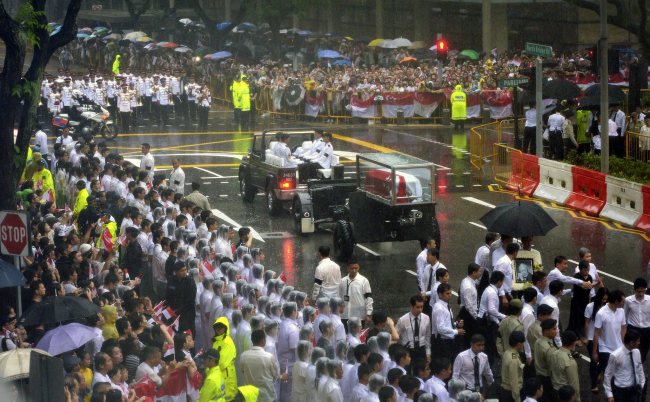Singapore bids farewell to LKY
South Korean president attends Lee’s state funeral
By Korea HeraldPublished : March 29, 2015 - 18:43
Singaporeans bade one last farewell to their founding leader, Lee Kuan Yew, who transformed the former British colony into one of the wealthiest states in the world, in an elaborate state funeral Sunday.
Thousands of people braved heavy rain ― many openly weeping, waving flags and throwing flowers ― along a 15-kilometer route through the Southeast Asian city-state to extend their grief over Lee, who died of pneumonia last Monday. He was 91.
Thousands of people braved heavy rain ― many openly weeping, waving flags and throwing flowers ― along a 15-kilometer route through the Southeast Asian city-state to extend their grief over Lee, who died of pneumonia last Monday. He was 91.

Lee’s dark brown wooden casket, draped in the red-and-white Singaporean flag, left parliament in a glass case atop a gun carriage, and passed by landmarks associated with the British-trained lawyer’s 60-year political career. The motorcade ended at the National University of Singapore for a funeral service attended by Asia-Pacific leaders and other dignitaries.
Howitzers gave Lee a 21-gun salute normally reserved for sitting heads of state, even though he was just a member of parliament when he died. Four F-16 fighter jets from the Air Force’s aerial display team, the Black Knights, displayed a formation known as “The Missing Man,” with one of the planes peeling away to signify Lee’s passing.
During the funeral service, his son and the current prime minister of Singapore, Lee Hsien Loong, said that the wealthy Southeast Asian city state he helped build would be his monument.
“To those who seek Mr. Lee Kuan Yew’s monument, Singaporeans can reply proudly: Look around you,” Lee said. After the ceremony, his body was cremated.
World leaders including South Korean President Park Geun-hye, also gathered in the city-state to bid adieu to Lee, whom they recalled as a visionary and legendary leader.
President Park, in her condolence message, wrote that Lee was “a monumental leader of our time” and that his name would “remain forever engraved in the pages of world history.”
Park was the first South Korean president in 15 years to attend a funeral held in foreign countries, her office said.
President Park had shared a close relationship with the former leader of Singapore and his family since the 1970s when her father, the late President Park Chung-hee, was in power.
In 1979, Park, who served as Korea’s first lady after her mother’s death, joined a state banquet held between her father and Lee as a translator.
She said in her autography in 2007 that Lee and her wife were like parents who showed affection to her during their brief meetings in the past.
Her attendance to Lee’s funeral also drew keen attention from local media over her encounter with Japanese Prime Minister Shinzo Abe who invited fresh criticism over his remark on Japan’s sexual enslavement of women during World War II. In an interview with the Washington Post, the Japanese premier called the issue “human trafficking” without specifying the perpetrator, keeping his vague position over Japan’s responsibility for the atrocity.
At the funeral ceremony, Park proposed to Abe that South Korea, China and Japan take necessary steps to carry out agreements reached by the three nations' top diplomats earlier this month.
Australian Prime Minister Tony Abbott, Indian Prime Minister Narendra Modi, Indonesian President Joko Widodo, Malaysian King Sultan Abdul Halim Mu’adzam Shah and Brunei’s Sultan Hassanal Bolkiah were also among the leaders attending the funeral. Former U.S. president Bill Clinton led the American delegation that also includes former secretary of state Henry Kissinger, a close friend of Lee.
Lee was Singapore’s prime minister for more than three decades, ruling with an iron grip until 1990. He is regarded by Singaporeans as the architect of their nation’s prosperity and harmonious race relations, but his authoritarian rule was criticized for restricting free speech, taming media and stunting democracy.
Singapore has one of the highest GDP per capita incomes in the world, at $56,284 in 2014, up from a mere $516 when it gained independence. Ninety percent of Singaporeans own their homes, thanks to a public housing scheme launched by Lee, and the country enjoys one of the lowest crime rates in the world.
By Cho Chung-un, news reports
(christory@heraldcorp.com)
-
Articles by Korea Herald





![[Herald Interview] 'Amid aging population, Korea to invite more young professionals from overseas'](http://res.heraldm.com/phpwas/restmb_idxmake.php?idx=644&simg=/content/image/2024/04/24/20240424050844_0.jpg&u=20240424200058)












![[KH Explains] Korean shipbuilding stocks rally: Real growth or bubble?](http://res.heraldm.com/phpwas/restmb_idxmake.php?idx=652&simg=/content/image/2024/04/25/20240425050656_0.jpg&u=)

